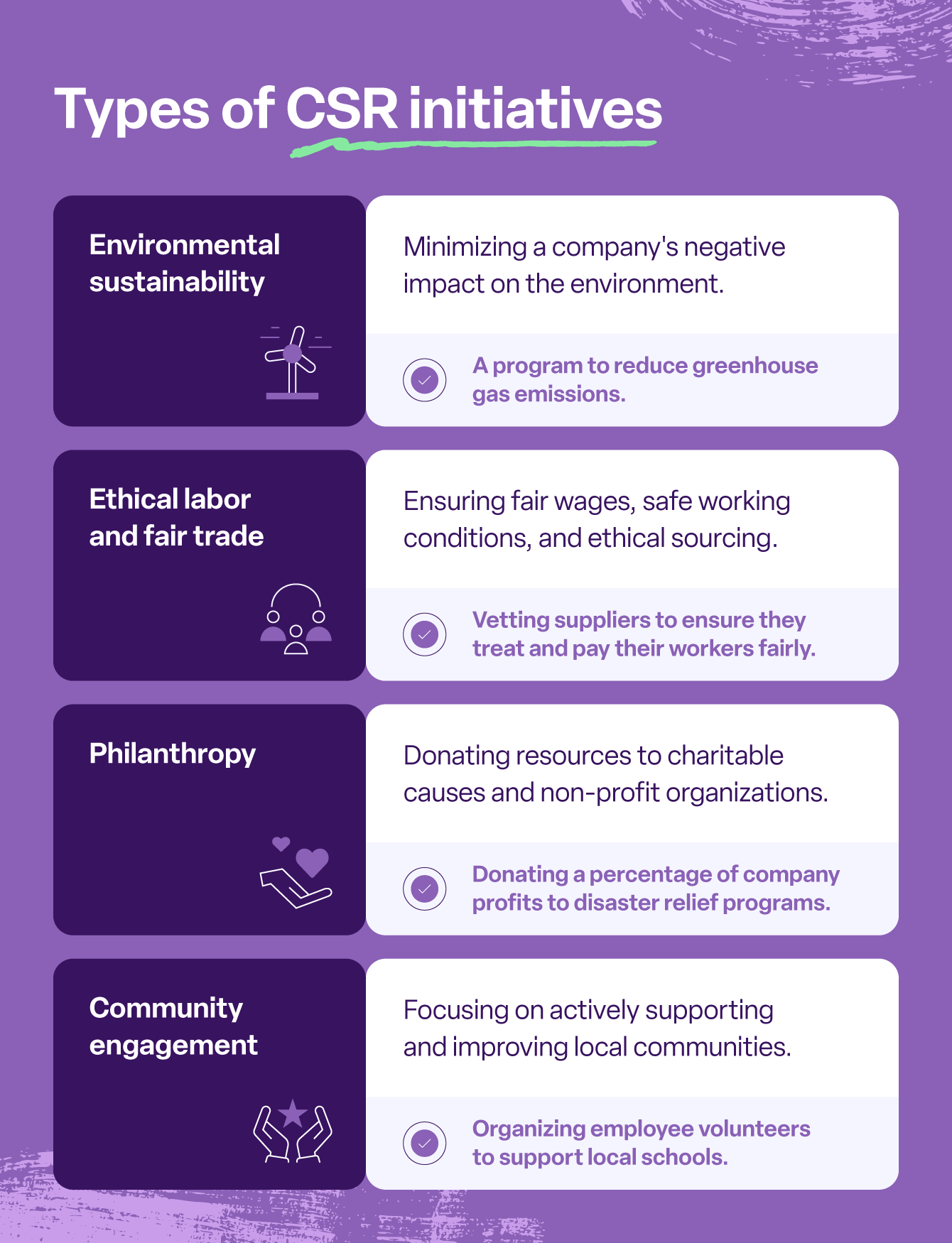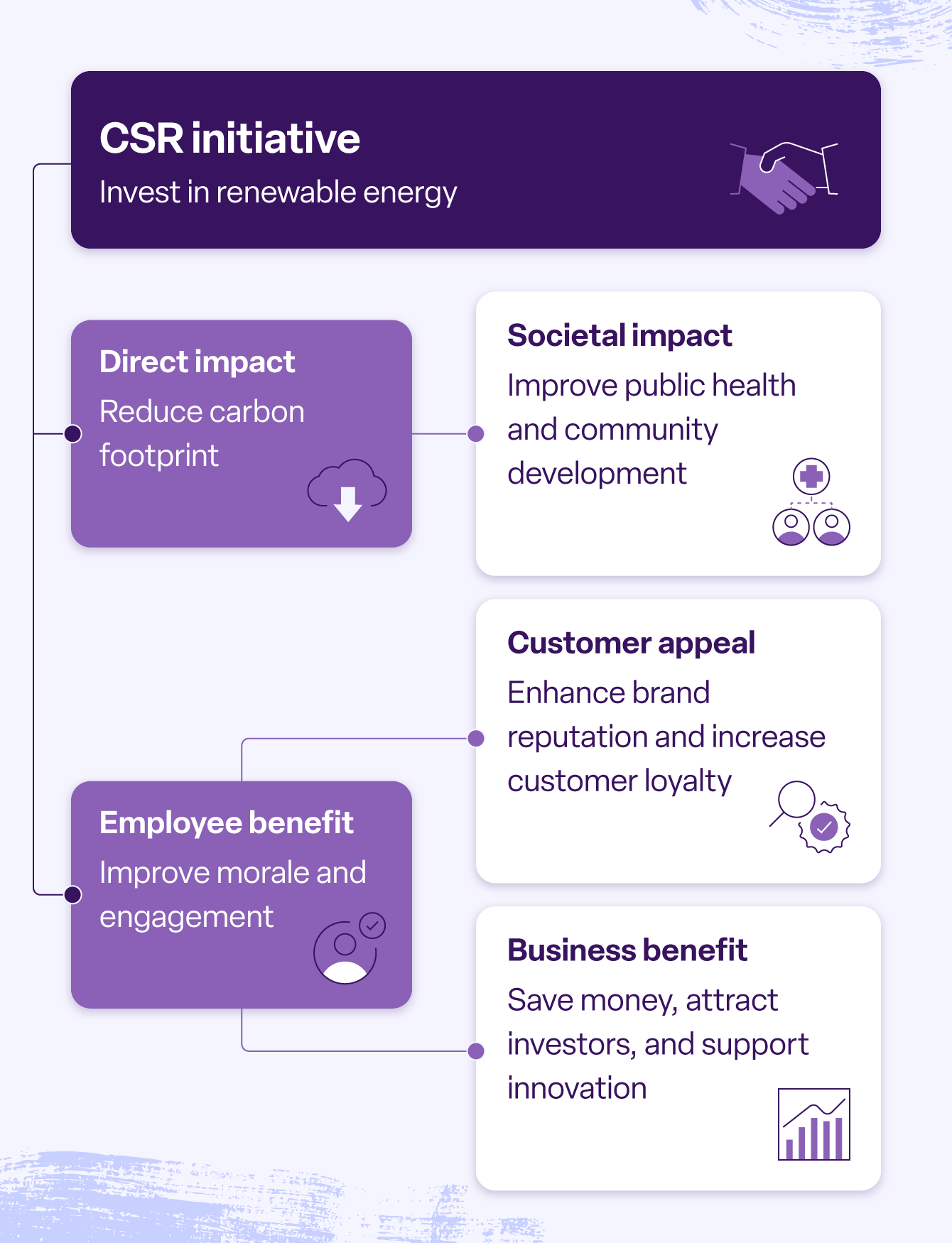19 socially responsible companies to inspire your CSR efforts

These days, it’s not enough for a business to simply sell their product or service. While that may bring in revenue, it’s not likely to transform the company into a well-respected household brand. What will? Social responsibility. Socially responsible companies focus on values, ethics, and using their resources to make the world a better place.
Now more than ever, consumers prefer brands that make an impact on society, especially when it comes to social issues or environmental sustainability. In fact, 79% of Gen Z and 81% of millennials say businesses must do more to help consumers make sustainable purchasing choices.
Developing corporate social responsibility (CSR) strategies doesn’t happen overnight, but tools like Bonterra can help make it easier.
Before you start any initiatives, it’s important to understand what a socially responsible company is and how to think about CSR. Let’s get started.

What is a socially responsible company?
Corporate social responsibility is a business’s commitment to initiatives that improve the world around us. For instance, CSR initiatives may include environmental sustainability efforts, ethical labor practices or fair trade, philanthropy, or community engagement.
A socially responsible company is one that engages in CSR efforts and integrates these practices into their organization. Rather than simply focusing on business, these companies strive to make positive change and consider the environmental, social, and ethical impacts of their business decisions.

Want to take your organization’s philanthropic efforts further? The right CSR software can help you engage your employees and boost your impact.
19 socially responsible companies
The below companies were selected based on their commitment to social and environmental values, meaningful recent initiatives, and demonstrated measurable impact on their areas of focus.
There are several types of corporate social responsibility — environmental, economic, philanthropic, and ethical — and most of these companies engage in at least a few of each.
| Company | CSR initiative examples |
| Microsoft | Environmental conservation Improving healthcare outcomes |
| Water conservation Wind power Zero-waste | |
| HP | Renewable energy Training and education access |
| Cisco | Networking and career building Renewable energy |
| General Electric | Decreasing CO2 emissions Girls in STEM Low-cost gas turbines |
| Johnson & Johnson | Addressing healthcare and societal challenges Global health education |
| Merck | Health equity Employee volunteer programs Maternity care access |
| Pfizer | Reduction of greenhouse gas emissions Disaster response and relief efforts |
| Dr. Bronner’s | Support for incarcerated individuals Regenerative organic agriculture |
| Patagonia | Fair Trade Certified production Animal welfare and improving quality of life for farmers |
| Levi Strauss & Co. | Robust employee giving and volunteer programs Community profit-sharing Striving for net-zero emissions |
| TOMS | Employee volunteer program Donates to mental health partners Supports organizations providing medical and mental health services |
| Adidas | Deforestation- and conversion-free supply chain Net-zero emissions by 2050 Addressing human rights issues and risks |
| Ben & Jerry’s | Fair Trade Certified ingredients Recycles waste to generate energy |
| Chipotle Mexican Grill | Diverted waste from landfills Collecting charitable donations from customers Provides scholarships |
| LEGO | Recycled materials in products Sustainable packaging |
| The Walt Disney Company | Improving children’s hospital patient experiences Contributes to the protection of wildlife species and habitats Supports organizations working to address fair trade and human rights issues |
| Ford Motor Company | Supports environmental preservation and stewardship Partnerships to expand access to education |
| Bosch | Access to education Environmental sustainability Carbon neutral since 2020 |
1. Microsoft
Industry: Software/technology
Technology giant Microsoft is no stranger to CSR initiatives. Over the years, they’ve focused on initiatives ranging from sustainability, ethical AI, preservation of fundamental rights, and privacy and security. Plus, they offer a robust employee giving and volunteer program,
Examples of corporate social responsibility initiatives
- Environmental conservation: Microsoft launched an ecosystems and biodiversity initiative in 2020, with which they’ve pledged to protect land and advance sustainability.
- Improving health outcomes: Microsoft’s AI for Health initiative supported IRIS (Intelligent Retinal Imaging Systems) to enable healthcare workers to remotely capture eye images, preventing more than 37,000 cases of blindness as of 2024.
CSR fun fact:
Within the last 50 years, Microsoft’s giving in the state of Washington has surpassed $1.3 billion, and their employees have logged at least 6 million hours of volunteer work.
2. Google
Industry: Software/technology
Google has long been known as a company that is dedicated to CSR. They focus heavily on sustainability to help communities reduce 1 gigaton of emissions per year by 2030 through their products. At the same time, they strive to reach net-zero emissions across all Google operations. Part of this work involves using AI responsibly to further research and solution design.
Examples of corporate social responsibility initiatives
- Water stewardship: With a goal to replenish 120% of the water they consume, Google works to enhance water resource management, address water-related challenges, and improve relevant ecosystems.
- Wind power: Google entered into power purchase agreements for over 700 megawatts of clean energy, projecting to reach over 90% carbon-free energy in the Netherlands, Poland, and Italy.
- Circular economy: Google strives to send zero waste to landfills from its data center operations and divert office food waste from landfills.
CSR fun fact:
Google partnered with EDPR NA Distributed Generation to create a 500-megawatt solar portfolio, with 10% of the portfolio’s revenues redirected each year as utility bill credits for households with a high energy burden.
3. HP
Industry: Hardware/technology
HP focuses its CSR efforts on climate action, human rights, and digital equity. On the climate front, their goal is to reduce emissions by 2030 and achieve net-zero by 2040.
To support their focus on human rights, they diversify their supplier base, support entrepreneurs in underserved communities, and have developed a human rights and ethics policy. And when it comes to digital equity, they strive to expand access to knowledge, particularly for those in marginalized or underserved communities.
Examples of corporate social responsibility initiatives
- Reducing energy usage: HP works to power their operations with 100% renewable energy through projects like LED lighting upgrades and high-efficiency energy upgrades.
- Entrepreneur support: The HP Learning Initiative for Entrepreneurs offers training in relevant skills to underserved entrepreneurs.
CSR fun fact:
Since 2019, HP has used over 1 billion pounds of recycled materials in their products and packaging.
4. Cisco
Industry: Technology
Cisco is known for their computer networking products, like routers and switches, as well as tools related to cybersecurity and data center tech. The section of their website devoted to “purpose” states that, through nonprofit partnerships, they’ve leveraged social impact grants and their own Cisco Networking Academy to impact over one billion people. Their vast portfolio of initiatives includes those focused on sustainability, social impact, digital impact, philanthropy, diversity and inclusion, responsible sourcing of materials, security, and public policy.
Examples of corporate social responsibility initiatives
- Cisco Networking Academy: This skill-development program impacted 4.7 million people in 2024, preparing them for careers in networking-related fields.
- Renewable energy: 96% of the electricity used at Cisco facilities came from renewable energy sources in 2024.
- Climate impact: Since 2021, $35 million has been approved to go toward climate-related solutions via the Cisco Foundation.
CSR fun fact:
86% of Cisco employees participated in community impact initiatives in 2024, including 720,000 employee volunteer hours.
5. General Electric
Industry: Aerospace, power, and renewable energy
General Electric (GE) has been around since 1892, starting as a conglomerate and splitting into several distinct organizations — GE Aerospace, GE Vernova, and GE HealthCare. Focal points of GE’s CSR initiatives include electricity access, emissions reduction, and decarbonization. Their sustainability framework is broken into four pillars: electrify, decarbonize, conserve, and thrive.
Examples of corporate social responsibility initiatives
- Decarbonization: Grid Solutions, under the GE Vernova umbrella, has launched a decarbonization portfolio that features equipment that significantly decreases CO2 emissions.
- STEAM Girls Summer Camp: GE hosts young girls ages 10-14 for educational camps to encourage an interest in science and technology.
- Coal-to-gas switching: In 2024, GE Vernova installed their 100th HA gas turbine, which provides the lowest-cost conversion of gas to electricity.
CSR fun fact:
In 2024, GE Aerospace gave $21.5 million to nonprofits and partner organizations, from a mix of employee contributions, matching gifts, and company donations.
6. Johnson & Johnson
Industry: Health and wellness
Johnson & Johnson (J&J), which operates in areas including pharmaceutical products, medical devices, and consumer health, has a mission of caring for people’s health and wellness. This expands to their CSR efforts, with a commitment to community giving, social impact, philanthropy, and sustainability. Goals include championing global health equity, empowering employees, and furthering the health of the environment.
Examples of corporate social responsibility initiatives
- Community Impact Switzerland: J&J is working to address healthcare and societal challenges in Switzerland. They do this by focusing on employee impact through volunteering, partnering with nearly 40 organizations and giving employees four days of paid leave per year to volunteer.
- Talent for Good: Employees are encouraged to leverage their skills and knowledge to serve communities in need.
- WHO Academy: J&J donated $7 million to the Institut de France, which is heavily involved in the launch of the WHO Academy — a learning system for health workers.
CSR fun fact:
J&J Foundation’s Impact Ventures provides resources and capital to entrepreneurs to improve healthcare around the world. So far, they’ve reached over 90 million patients and 800,000 healthcare workers.
7. Merck & Co.
Industry: Pharmaceutical
Merck is well known for their work developing vaccines, therapies, and medications as one of the world’s largest pharmaceutical companies. There is also an animal health division that focuses on veterinary products and solutions. According to their last impact report, Merck reached over 550 million people with medications and vaccines, supporting their goal to deliver innovative global health solutions. Additionally, Merck strives to achieve a net-zero greenhouse gas target by 2045.
Examples of corporate social responsibility initiatives
- Access to health: Merck has reached about 80% of countries globally with their products.
- Philanthropy: Merck provides donations — both financial and product-based — to promote health equity, while also offering employee volunteer programs and grants.
- Merck for Mothers: This $650 million initiative focuses on improving access to maternity care, maternal health innovation, and reducing the global maternal mortality rate.
CSR fun fact:
In 2023, Merck spent $3.6 billion with small, diverse Tier 1 and 2 suppliers as part of their initiatives to embrace diversity and invest in growing businesses.
8. Pfizer
Industry: Pharmaceutical
Pfizer is one of the oldest pharmaceutical companies in the United States, and their Pfizer Foundation (a separate legal entity) has existed since the 1950s with a goal of improving community health. The company’s corporate social responsibility efforts include sustainability, fighting misinformation, human rights, and more.
Examples of corporate social responsibility initiatives
- Emission reduction: Pfizer successfully reduced their greenhouse gas emissions by 60% from 2001 to 2020.
- Misinformation fighting: Pfizer has created a dedicated website to address health-related myths and false information, serving as a source for credible, evidence-based information.
- Disaster and health crises support: The Pfizer Foundation and Pfizer collaborate with partners to improve disaster response and relief efforts through cash grants and product donations. Examples of their support include assisting with the Europe and Middle East refugee crisis, the Zika outbreak, and Hurricane Matthew.
CSR fun fact:
In 2024, Pfizer employees participated in 175 Days of Good, ultimately completing more than 38,200 volunteer hours and supporting over 880 organizations.
9. Dr. Bronner’s
Industry: Personal care
Dr. Bronner’s is known for their “all-one magic soap,” among other personal care products. Founded by Dr. Emanuel Bronner to unite the world through a message of unity across divides, the company continues to honor their founder’s vision by focusing on social and environmental responsibility. Areas of particular focus include agriculture and the food system, drug and criminal justice reform, animal advocacy, and civil rights.
Examples of corporate social responsibility initiatives
- Drug policy and criminal justice reform: Dr. Bronner’s contributes to organizations supporting the incarcerated, including over $695,000 to Jail Guitar Doors, while advocating for legalization of plant-based therapies.
- Civil rights: The company leverages philanthropy and partnerships to benefit those who are oppressed or marginalized, supporting organizations such as The Migration Justice Initiative (MJI), Movement for Black Lives (M4BL), and Gender Illumination.
- Agriculture and environment: Dr. Bronner’s supports regenerative organic agriculture and invests in initiatives that promote soil health, biodiversity, and fair farming.
CSR fun fact:
In San Diego County alone, Dr. Bronner’s has contributed over $7 million to 100+ nonprofits, focusing on those that serve youth, families, and those experiencing homelessness.
10. Patagonia
Industry: Retail
Patagonia, a retailer of outdoor gear and clothing, is a Benefit Corporation (B Corp), which means employees, the environment, and communities are held in equal esteem to shareholders. The CSR initiatives Patagonia supports relate to farming, farmer and worker conditions, fair trade and labor, and responsible sourcing and purchasing.
Examples of corporate social responsibility initiatives
- Fair trade: Over 90% of Patagonia’s line of products are manufactured in Fair Trade Certified factories.
- Migrant worker support: For over 10 years, Patagonia has worked to eliminate unethical hiring fees that migrant workers may be charged to get employment, with a goal to eradicate human trafficking and forced labor.
- Regenerative Organic Alliance: This Patagonia-founded nonprofit serves to rehabilitate soil, foster animal welfare, and improve farmers’ lives.
CSR fun fact:
Over 2,000 farmers have benefited from the Regenerative Organic Certified programs Patagonia has developed for food and cotton farming.
11. Levi Strauss & Co. (LS&Co.)
Industry: Apparel
One of the most well-known denim companies, Levi’s has been a mainstay in the American apparel world since the 1800s. In that time, the company has supported many social initiatives, from desegregated facilities in the 1960s to worker protections and support for the LGBTQ+ community in the 1980s. The Levi Strauss foundation focuses on the advancement of human rights, while the Red Tab Foundation offers support for LS&Co. employees and retirees facing financial hardships.
Examples of corporate social responsibility initiatives
- Community engagement: LS&Co. Offers an annual day of service, a $2,000 annual match of charitable giving or volunteer time, and paid time off for community involvement.
- Profit reinvestment: LS&Co. shares their profits with the community, particularly supporting voting rights and gun violence prevention.
- Sustainability: The company focuses on climate, consumption, and community, striving for net-zero emissions, worker health, and more.
CSR fun fact:
The Levi Strauss Foundation has invested $387 million since their founding in 1952, focusing on advancing human rights and well-being in underserved communities. Organizations include Define American, Border Butterflies Project, Red de Mujeres Sindicalistas (RMS), and the International Planned Parenthood Federation.
12. TOMS
Industry: Footwear
TOMS shoes started out with a mission of donating one pair of shoes for each pair sold — their One for One business model. This resulted in over 100 million pairs of shoes donated to children in need around the world. Now, TOMS gives a third of their profits to support grassroots organizations driving progress at the local level, benefiting 32 partners in 2024. These partners range from mental health services to LGBTQ+ support to refugee assistance.
Examples of corporate social responsibility
- Employee volunteering: TOMS closes their global offices yearly so employees can spend time volunteering in their communities.
- Mental health: TOMS has given over $4.4 million to mental health partners.
- Humanitarian aid: One of TOMS’s longest-standing partners is the International Medical Corps, which provides medical, mental health, and training support to communities around the world.
CSR fun fact:
Since 2014, over 81,000 TOMS products have been recirculated thanks to the company’s in-house resale platform.
13. Adidas
Industry: Apparel
Adidas strives to change lives through the power of sports. For over two decades, the company has focused on sustainability, and a diverse workforce is held in high esteem as the key to success. As the company invests in innovation, it’s focused on using alternatives to synthetic materials and new manufacturing techniques that reduce energy consumption and waste.
Examples of corporate social responsibility initiatives
- Biodiversity: Adidas has set a goal of a deforestation- and conversion-free supply chain by 2030.
- Net zero: The company is also working to achieve net-zero emissions by 2050.
- Fair labor: Adidas commits to identifying and addressing human rights issues and risks, ensuring safe conditions and fair practices in their supply chain.
CSR fun fact:
Adidas has a global target of 50% women in leadership, with a current status of 41%.
14. Ben & Jerry’s
Industry: Food and beverage
Ben & Jerry’s may be as well known for their activism as they are for their ice cream flavors with creative names. While ice cream is the product, the company “strives to be a social justice company that makes ice cream.”. Specific causes they support include human rights, social and economic justice, and environmental protection.
Examples of corporate social responsibility
- Fair trade: Ben & Jerry’s was the first ice cream company to use ingredients that were Fair Trade Certified, and over the years, the organization has developed a program called Producer Development Initiative to improve smallholder farmers’ and producers’ livelihoods.
- Democracy: Ben & Jerry’s started the Democracy is in Your Hands Campaign to encourage citizens to take action and build a democracy for all, primarily through expanding voting rights.
- Productive waste: Waste from the company’s production process is used to generate energy that powers farms.
CSR fun fact:
Ben & Jerry’s has a goal to reduce greenhouse gas intensity by 80% by 2050.
15. Chipotle Mexican Grill
Industry: Restaurant
Fast-casual Mexican restaurant chain Chipotle follows the motto “Cultivating a Better World.” Areas of focus include people — employees as well as the communities served — as well as food, animals, and the environment.
In 2024, Chipotle donated over $7 million to charity, and 100% of ingredients used met the company’s Food with Integrity standards. For 2025, the company is focused on sourcing local produce, understanding employee sentiment, and reducing greenhouse gas emissions.
Examples of corporate social responsibility initiatives
- Environmental conservation: In 2024, Chipotle diverted over 497 million pounds of waste from landfills.
- Philanthropy: Chipotle’s Round Up for Real Change program collected $20 million in charitable donations from customers.
- Partnerships: The company provided over $320,000 in scholarships and matched 700 hours of employee volunteer time, both through the Cultivate Foundation.
CSR fun fact:
Chipotle donated over 405,000 pounds of food through the Harvest Program in 2024.
16. LEGO
Industry: Toys
The LEGO vision is to support Learning Through Play, helping children (and adults!) use play to build confidence, problem-solving skills, and creativity. The company’s CSR initiatives focus on ensuring a healthy planet and world for today’s children. This work takes the form of increasing sustainable packaging and product materials, climate action, and creating products built to last.
Examples of corporate social responsibility initiatives
- Recycled materials: LEGO has introduced tire pieces made from over a third of recycled materials from fishing nets, ropes, and engine oil.
- Sustainable packaging: LEGO has incorporated paper into packaging, rather than single-use plastic.
- LEGO Replay: This take-back initiative keeps LEGO blocks circulating, rather than in a landfill. Plus, the previously loved toys are sent to kids in need.
CSR fun fact:
24% of LEGO employees (that’s 7,000+ people) participated in volunteer work in 2024.
17. The Walt Disney Company
Industry: Entertainment
Disney has a strong commitment to doing good in the world. This includes a focus on social impact (especially for children), inclusion, environmental sustainability, and responsible operation. Social impact highlights include charitable giving and employee volunteer hours, as well as supporting hundreds of thousands of Make-A-Wish kids. Disney has also invested $145 million in community programs. Through environmental funds, Disney has protected thousands of wildlife species and habitats.
Examples of corporate social responsibility initiatives
- Children’s hospitals and wish granting: Disney has invested $100 million to improve children’s hospital patient experiences and grant wishes for kids in treatment for life-threatening illnesses.
- Environmental conservation: The Disney Conservation Fund has helped protect over 1,000 wildlife species and safeguard over 315 million acres of habitat.
- Supply Chain Investment Program: This program provides grants to organizations working to address issues like forced labor, ethical recruitment, and supply chain traceability.
CSR fun fact:
Since 1983, Disney employees have completed over 13 million volunteer hours.
18. Ford Motor Company
Industry: Automotive
Automotive manufacturer Ford has a focus on environmental sustainability and community support. The company has reported on sustainability efforts for 25 years and has a goal of achieving carbon neutrality by 2050 (and by 2035 in Europe alone). They plan to achieve this through a focus on their vehicles (including increasing production and sales of electric vehicles), supply chain, and operations.
Examples of corporate social responsibility initiatives
- Bronco Wild Fund: In 2023, this fund provided over $2.3 million to projects related to environmental access, preservation, and stewardship.
- Ford Philanthropy: This arm of the organization partners with nonprofits and community organizations to expand access to services and education.
- Electric vehicles: Not only does Ford produce electric vehicles, but they also hope to increase access to public chargers. So far, Ford’s BlueOval Charge Network has expanded to over 128,000 chargers in North America.
CSR fun fact:
The electric pickup trucks sold in 2023 are projected to save 1.9 million metric tons of greenhouse gas emissions.
19. Bosch
Industry: Technology and services
Bosch, which has their roots in automotive parts, now operates across industries including automotive, industrial tech, consumer goods, and energy and building tech. The company has a longstanding legacy of operating as a socially responsible business; by 1929, the founder had donated the equivalent of more than $300 million to charitable causes. For the company’s 50th anniversary, he donated a hospital, and after his death, the Robert Bosch Foundation was established and currently holds 92% of company shares.
Today, Bosch focuses on community impact, employee volunteerism, and
nonprofit partnerships with organizations like FIRST® and Adler Zooniverse.
Examples of corporate social responsibility initiatives
- Bosch Community Fund: For over 12 years this fund has supported education in the community and furthering environmental sustainability.
- Stakeholder Dialogue Series: Bosch engages with policymakers, NGOs, and the public through conversations about timely political topics.
- Climate action: Bosch has been carbon neutral across their 450 locations since 2020.
CSR fun fact:
The Bosch Community Fund has invested over 3,000 grants into 39 communities.
How CSR initiatives can benefit companies
Companies that prioritize CSR don’t just affect meaningful change in the world, they also drive business value. Below are some of the most meaningful benefits of CSR initiatives.
- Promote ethical practices and fair labor: Companies that focus on upholding human rights, safe working conditions, and fair pay throughout the supply chain can reduce compliance risks and enhance long-term stability.
- Support community development: Investing in education, infrastructure, and health on the local level helps build stronger communities, which in turn can lead to a more supportive business environment and possible talent pipeline.
- Contribute to global change: Promoting sustainability and fairness throughout the world demonstrates your global leadership and social responsibility, which can enhance your reputation and elevate your status with partners who share your mission.
- Improve brand reputation: Showing up as a leader in ethical and sustainable behavior can enhance consumer and employee perception.
- Increase customer trust: As consumers continue to be concerned with sustainability and social good, they often look for companies that share their values. By making it clear that your values align with those of your customers, you’ll build loyalty, which can translate to customer retention and word-of-mouth promotion.
- Encourage employee engagement: Many employees want to work for a company that is doing good in the world and leading with values. By including employees in meaningful CSR initiatives, you’ll increase morale, motivation, and retention.
- Attract socially conscious investors: Companies that focus on environmental, social, and governance (ESG) work may see increased interest from investors seeking socially responsible companies.
- Grow your company and increase revenue: CSR initiatives can expand your market share as you develop and strengthen customer loyalty and brand awareness, ultimately driving toward higher profitability.

7 tips to embrace CSR in your company
A strong CSR strategy should be intentional, scalable, and relevant. Be sure that CSR is integrated into your overall operations, not simply a marketing vehicle. For the highest impact, consider using CSR software to streamline your work and further your progress.
Here’s how:
- Begin with values: Determine initiatives based on what best aligns with your mission, culture, and stakeholders.
- Include employees: Invite employees to share ideas, feedback, and questions, and bring leaders together to determine focus areas.
- Track and report results: Leverage data to track your performance and impact, then use it to iterate on your strategy as needed. You might measure KPIs like employee volunteer hours, matched donations, or the percentage of sustainable materials used for your products.
- Use CSR software: Software like Bonterra can help you streamline program management, data and reporting, and communication.
- Develop partnerships: Partner with nonprofits and other community organizations to drive exponential impact.
- Share your success: Promote your impact with your audience — internally and externally — to build trust and further accountability. Consider sharing via social media, marketing campaigns, and PR efforts.
- Keep going: CSR should be a core business function, not a one-time project. Consider aligning sustainability goals with your supply chain operations, developing employee volunteer programs, and integrating CSR impact metrics into your annual reporting.

Make a bigger impact with your social responsibility initiatives
Being a socially responsible company means talking the talk and walking the walk, so you need to develop the right systems and tools to further your initiatives. Whether you’re just stepping into CSR or looking to refine an existing strategy, you need the best CSR software to streamline your processes.
Bonterra CyberGrants is an excellent option. As an all-in-one CSR platform, Bonterra CyberGrants lets you harness the power of corporate philanthropy through seamless integration of grant management and employee engagement. Request a demo today to see how it can transform your CSR impact.
FAQ
What is an example of a socially responsible company?
Patagonia is a great example of a socially responsible company. It’s known for a focus on environmental sustainability, ethical sourcing of materials, and charitable donations. Other examples include TOMS, Dr. Bronner’s, and Google.
What are the top socially responsible companies?
Some of the top socially responsible companies include Microsoft, Ben & Jerry’s, Google, and Patagonia.
What are four examples of corporate social responsibility?
Four examples of corporate social responsibility are environmental sustainability, ethical labor practices, employee volunteering, and philanthropy or charitable giving. Many socially conscious companies focus on all four of these.
Work with Bonterra



